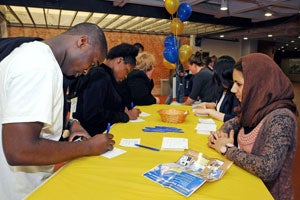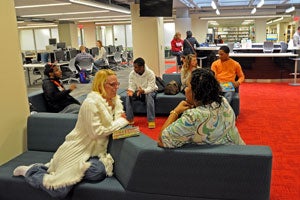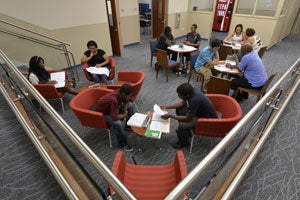"Mental Health Journey" by David Floria
This is my first year taking college classes, full time, so my identity these days is mostly as a
student, and a peer. My main environment outside of home is mostly a school building. People
there might think they can’t relate to me, because I have a learning disability, I am autistic, and I
have an intellectual disability. Fair enough, because a lot of people don’t even know what those
things are, really. They don’t expect me to blend in, and in a lot of cases, it’s true, I can’t,
because one symptom that is part of my autism is that I have autonomic dysfunction. You most
likely have never even HEARD of that, despite how common it is. It basically shows in public as
me passing out if I get too overheated, or having tachycardia after a hike up a long flight of
stairs, therefore I have a personal care assistant with me almost everywhere I go. So I probably
sound very non typical to a lot of people, and they might think that we have nothing in common.
But they’d be wrong. I stay up late at night doing homework, I get up in the morning with too little
sleep, I eat breakfast, I wash up, put my clothes on and brush my teeth. Then I'll likely get in the
car and head over to the college. Pretty similar to a lot of others, so far, right? But more to the
point, because people with disabilities, especially the kind that make it hard to communicate
with strangers, like autism, often have TERRIBLE anxiety, and often have depression too. That’s
something we very often share. How we cope with it, is probably another thing we probably
have in common.
The learning disability, the medical issues - those are like my secret identity struggles that
people find hard to imagine unless they themselves deal with it, or they have someone close to
them that does. Our ability as humans to empathize with issues outside of our own experience
is challenging when it seems like something so very different. I am a person of color, but with
white privilege. I can’t imagine what it’s like to have dark skin and suffer with microaggressions
all day long for my entire life. But I can sympathize.
I can’t imagine what it feels like to be born in the wrong body, or the kind of terror that my friends
and siblings on the LGBTQIA+ spectrum feel trying to navigate this world against a wall of hate.
But I can sympathize with that also, although I am told I have cis hetero privilege. It took me
awhile to learn what that means, sometimes abstract concepts are difficult to digest.
My grandmother has schizophrenia, and I have tried and failed to imagine what that is like. She
looks just like anyone else, but she hears voices and sees frightening things that the rest of us
don’t. Very few people understand her behavior, unless it’s her doctor and her closest family
members. I can’t bear the thought of suddenly losing your grip on reality at random, but she has
no choice, and must rely on others.
But because I can identify so strongly with an invisible challenge, I feel deeply for those that feel
“othered” for simply being non-typical, or different. But not less. I know I am not less, though
some days it’s hard not to feel that way, especially when the world, our communities, our
doctors, our instructors, our church bodies, even our closest friends and family members, have
expectations that are hard to live up to, even when they are seemingly reasonable.
When I find it hard to live up to expectations, I can often feel unwanted. I question if I should
even be in school, it’s really hard for me, because I process slowly, and I can’t keep up with the
pace. I don’t know how to make friends there, there are no on campus activities. For most of my
K-12 school history, I don’t feel like I was included there. It’s hard to include someone like me
with speech issues, I get it, but I still feel like it was a big part of their job to try harder.
A school should be for growth, not just academics. In the United States at least, we spend a
large part of our time and our entire childhood in a school. I never felt wanted. I don’t feel
wanted at church. I don’t feel wanted in the community. When I take time to process what I hear,
and don’t respond fast enough, most people don’t have patience for that. I can only attempt to
imagine then, how it is for other people - not wanted because they aren’t the right color, the right
gender, the right religion, the right weight, the right looks, the right neurology - most of those
things, like my own disability, we were born with. We had no control over those things. And yet
we are judged. Growing up, we are frequently scolded as we are being molded.
We may start to keep secrets, so we don’t feel judged. Maybe children and parents alike are
bewildered by the behavior of the other. The anxiety and depression can start very young. Do
we feel accepted? Do we feel encouraged? Not just by our families, but by the environment, and
the people who are there? Are we lucky enough to have friends and maybe substitute authority
figures, like teachers and coaches, in our lives, who affirm us and lift us up?
Then puberty comes hard for some of us, like a missile hurled at our emotions. We struggle
even more to understand why we feel the way we do. I grew in age and height, and the anxiety
grew along with me. I started to realize that the world was random, not stable - something I had
been blissfully unaware of as a young one. Like Adam and Eve in the Garden of Eden, when
your eyes are opened, you may have knowledge, and freedom, but you lose your protective
ignorance too.
The anxiety can be like a crushing weight of intensity, or a little gremlin, hovering just in the
background at all times, not getting in my way, but always with the potential of suddenly getting
up in my face and stopping me from moving. Depression can be crippling, and is definitely not
mutually exclusive with anxiety. It is an unwanted sibling that shares a small bedroom with
anxiety, it’s just impossible for them not to be intertwined. Sometimes I feel more of one than the
other, but I can’t separate them.
The world is a scary place, unless you’re kept in a bubble. It’s terrifying for those who are in a
bubble, and it feels like it suddenly burst. Like suddenly a curtain is pulled back, and you see the
world for how it really is, and your sense of fantasy safety is gone. Maybe it happened with
trauma, maybe it built up a little over time with experience, some people may think of that as
simply growing up. But I think it’s better to build the skills for coping alongside the exposure to
the real world. If kids and young adults are in a bubble, how do we let the air out a little bit at a
time?
The ability to perceive danger may happen all at once, or it can grow with negative experience.
For me, I had a few friends growing up that made my life feel better. Before puberty, before the
pandemic, I had a least one good “in real life” friend that I got to develop a relationship with on a
regular basis. I was sad when they moved away, but by the grace of god, another popped up in
their places. But I did start to develop online relationships as well, as I got my first iPad to help
me develop my speech and communication skills. Some of those experiences were good, some
were bad, and then one was REALLY bad. Nothing physically harmed me, but the abuse that I
suffered at the keyboard of a person that my parents, at first, didn’t even know about, was
frightening, and then downright scarring.
By that time I was keeping secrets, like most adolescents, I wanted some privacy by the loving
and well meaning adults in my life. But looking back, that really led to my downfall. It’s really
hard to warn parents about these dangers. They have to let us make SOME mistakes, even
when we are disabled. But they know well that the risks are too high, for many of us, even the
typical ones, in this time of technological advances that moves lightning fast. We have to make
mistakes or we can’t grow. But it’s important to let us make mistakes that aren’t too damaging,
that let us develop the judgment to be prepared for the damaging situations.
Further, we are shamed for things that aren’t in our control. That just increases the odds we will
keep secrets. That leads to an increased ability for people to exploit us as well.
It took me a long time to bounce back from the damage that was done to me, and it may linger
for a long time. But there are a lot of useful resources that worked for me, and I’m going to
share some of those. First of all, if you are the person struggling, keep looking for someone to
share your struggle with until it helps. I finally told my parents what was going on, and they were
scared and shaken that I had gone through it alone. They tried hard to help me after that. I was
so afraid that they would be angry, so I was relieved when they weren’t. But if you are too afraid
to reach out to your mom or dad, consider another “safe” relative, or other adult, like a youth
pastor or school guidance counselor.
Second, I started therapy. It didn’t go well at first, and then I had to switch counselors even to
someone who was better qualified to help. That wasn’t fun, going through the gory details of my
trauma more than once, but it was worth it, ultimately to have someone who could help me
better. I also started seeing a psychiatrist for medication that could take the edge off the anxiety
and depression. Some people think of that as a crutch, and I’m ok with that - it was just one tool
in the box to help.
I started rebuilding my relationship with my parents to the point where I felt like I could tell them
anything. Knowing that they would be there for me, in the good and the bad, was a huge relief.
They didn’t shame me, and that went a long way to recapturing my self esteem.
For the last five years, I have mostly only socialized online, like a lot of people during the
pandemic. I have a weak immune system, so you could consider that the pandemic isn’t quite
over for me. But I have made some really good friends there now, and I have found other ways
to engage in my community. I have online groups of young advocates, as well as accepting a
position on the Youth Move PA Advisory Council. Those things make me feel like I’m taking my
power back. It will be a marathon, not a sprint. But it can go back in the right direction, if you
take that first step of reaching out for help. It can take a lot of courage, but in the end, it will be
worth it.








